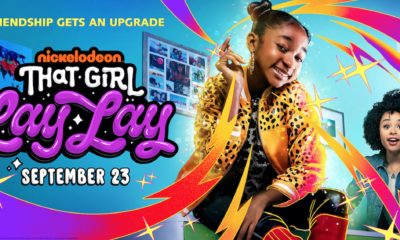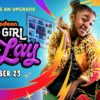Uncategorized
Shero of the Month: Gabby Frost, CEO & Founder of Buddy Project
“Asking for help is not a sign of weakness, it is a sign of strength.”
by Danielle Sinay
Mental illness affects over 56 million people in the country, and it’s nothing to be ashamed of. But mental illness is unfairly stigmatized all the time, especially for teens: Thousands of people are led to believe that struggling with mental illness, and/or finding it difficult, or impossible, to cope, is a sign of weakness. It’s not.
But so many people still feel isolated, like they’re battling their mind all on their own. And just because celebrities like Amanda Seyfried and Kylie Jenner have revealed that they struggle as well, doesn’t mean that we’ll feel any better. Sometimes, all we really need is someone to talk to about it, and to turn to for support. Well, good news: finding that supportive friend is now easier than ever.
Enter: Gabby Frost, CEO and Founder of Buddy Project.

At fifteen years old, as a freshman in high school, Gabby founded Buddy Project, which aims to prevent suicide, self harm and eating disorders by pairing teens with a personal support system, AKA, their buddy. By promoting positivity and companionship, as well as providing resources and education on mental illness and the harms of bullying and cyber-harassment, Buddy Project hopes to de-stigmatize mental illness for everybody – especially teens. And Gabby’s brilliant plan is working – over 148,000 people have used the service to find a Buddy, and that number is growing by the minute.
Gabby is now 18-years old (almost 19!) and a freshman at Drexel University, and Buddy Project is doing better than ever. We’re in total awe of everything she’s accomplished, and we’re so honored to have been able to talk to her about her personal story, experience with mental health issues, and the inspiring story behind Buddy Project.
Read on for our Q&A with our Gabby Frost, YSBnow Shero of the Month!

When did start advocating for mental health awareness? At what moment did you realize that this is what you want to do with your life?
I began advocating for mental health in 8th grade, 2012-13, when my best friend at the time told me she was going through mental illness, self-harm, and suicidal thoughts. It also helped that Demi Lovato began speaking out about mental health because it motivated me to speak about it too. I realized that I wanted to be an advocate for the rest of my life the first day I made Buddy Project. When I created it, I only expected it to get a minimal amount of sign up, but it got about 3000 in less than 24 hours. The amount of people who also wanted to prevent suicide and raise awareness for mental health through my program made me realize it was something I had to continue doing.
What is the story behind Buddy Project? What inspired you to start such an incredible nonprofit at such a young age?
Buddy Project started on the night of April 8th, 2013. I was unable to fall asleep for school one night and thought going on Twitter would help me fall asleep. I used to be a fangirl of Justin Bieber and One Direction, and constantly used Twitter to find people from all over the world with the same interests as me. A lot of people that I followed were going through the same problems as my best friend, and on that night there were three girls who thought suicide was the only answer.
After tweeting them support and trying to get others to send them messages, I examined their profiles to see if there were any influences (other than mental illness) on their suicidal thoughts. I noticed that all of them said they had no supportive friends or family to be there for them. That’s when the idea hit me.
I realized how strong the friendships were that I made through Twitter and fangirling over Justin and One Direction, and thought I should create a way for people to find a friend who has similar interests as them. This simple idea sparked the creation of Buddy Project.
Have you personally struggled with your mental health? If so, how did you overcome these struggles?
I usually don’t talk about my own struggles because I’ve never been to a professional, but I deal with anxiety. Throughout most of middle school and high school, I got social anxiety when interacting with classmates. I wouldn’t go to certain class events because I felt ashamed to go alone. I always thought that my classmates secretly hated me and were talking about me behind my back if I was near them.
My social anxiety isn’t as bad as it used to be and from time to time, I get anxious thoughts but just banish them from my mind. I get anxious about things that aren’t even a big deal. My friends always have to reassure me that I’ll be fine, but I just can’t get my mind to shut up and stop making me think the worst case scenario is going to happen. I even think of irrational situations in my head and think how it could play out in negative ways. It’s hard to explain how I feel when I have anxiety, but I know that I want to speak to a professional so I can learn how to cope in the correct way.
How do you sign up for Buddy Project? Can anyone sign up?
You can sign up for Buddy Project by going to http://www.buddy-project.org/signup. Anyone can sign up, regardless of age, but at the moment we don’t receive many sign ups for people past the age of 25. We pair anyone 13-24 with someone around the same age that shares a similar interest. Anyone over 25 is paired with someone else solely based on their age.
Was it scary creating a nonprofit all on your own? Have you faced any obstacles or experienced criticism as such a young woman running such a great organization?
When I first created Buddy Project, I thought no one would take it seriously because it was created by a 15-year-old fangirl. I’ve definitely faced obstacles technologically, and still do. I handle criticism well and try to constructively listen to improve Buddy Project. Overall, I’m an optimistic person, so hearing negative things doesn’t usually phase me.
As of October 14th, 2016, over 148,000 people have signed up to receive a buddy – how does it feel having your wonderful organization achieve such success?
It honestly feels surreal. It’s hard to imagine that many people have gone through the sign up and wanted to be a part of my movement puts me in awe. Since Buddy Project is only online (for now), it’s hard to kind of see the messages I receive as actual people writing them. Technology doesn’t take away from the impact, but it’s so different hearing what people think about Buddy Project online than in person. I do feel a lot of genuine feelings when reading feedback, but I feel like once I can meet people a part of the program and do work in person I’ll be able to feel all of the emotions possible.
Who are your personal role models?
My number one role model would have to be Demi Lovato. She’s a passionate advocate for mental health and it would be a dream to make as much of an impact she has. She fearlessly speaks up about mental health and isn’t afraid to say she has bipolar disorder and other mental illnesses.
I also look up to Halsey. She is similar to Demi in fearlessness and won’t hold back to state how she feels.
What is a Buddy Project “Ambassador,” and how do you become one?
A Buddy Project Ambassador is someone who wants to help me out with improving Buddy Project. You can become one by applying on our website (http://www.buddy-project.org/ambassadors/).
What are other ways people can help support Buddy Project?
People can also help support Buddy Project by donating to our cause. We’re a registered charity and plan on giving back to local mental health facilities and mental health research organizations.
What’s the next step for Buddy Project? What’s your ultimate goal for the nonprofit, and for you professionally?
The next step is an app and improved website! I would love if Buddy Project could be its own social networking site and app. Having login capabilities would definitely increase the amount of users because it would allow people who don’t have Twitter or Instagram to sign up.
I’d love to add more resources to the site and allow people to find places around them to find professional help. Adding resources for the LGBTQ+ community would also be ideal as a large amount of LGBTQ+ people have a mental illness or suicidal thoughts.
What advice do you have for teens who are struggling with mental illness?
There is no shame in having a mental illness. If you believe you have a mental illness, please try and find someone you trust and let them know. Asking for help is not a sign of weakness, it is a sign of strength. Brains are an organ and they can get sick too. No one expects someone with a kidney disease to just wait for their kidney to heal itself, so don’t think it’s wrong to get help with your brain. Just because you can’t see your illness doesn’t mean it isn’t valid. There are people out there who care about you and you will find them. Don’t give up on yourself because you have the strength to keep going, I believe in you.
If you could say one thing to your younger self, what would it be?
Cherish the time you have with people special to you. I would do anything to go back and spend time with my grandparents. I would also tell myself to speak up more. I wish I would have used my voice for better when I was in middle and high school instead of standing on the sidelines and doing nothing.

Our mission at YSBnow is to remind teens that they are beautiful NOW, however they define “beauty” for themselves. What advice do you have for our readers who may be struggling with self-confidence and acceptance? What do you do for yourself to feel good and confident about yourself?
There’s no wrong way to have a body. Whatever weight, size, or shape you may be, there’s nothing wrong with you. It’s definitely hard to love everything about yourself, but if you were any different you wouldn’t be yourself. Instead of comparing yourself to others, try to embrace your different traits. There isn’t a certain mold your body needs to fit to be beautiful.
Sometimes I struggle with loving my body, and when I do I always remind myself of everything I just stated. I was born to not look just like other people; I was born to be myself.
Follow Gabby on Twitter: @gabby_frost.
Click here to sign up for a buddy, and buy a t-shirt for their “Stronger Than the Stigma” campaign here!
If you or someone you know is experiencing emotional distress, call the National Suicide Prevention Lifeline at 1?800?273?TALK (8255) or Live Online Chat.
If you or someone you know is having a medical emergency, leave the computer and dial 911.


















